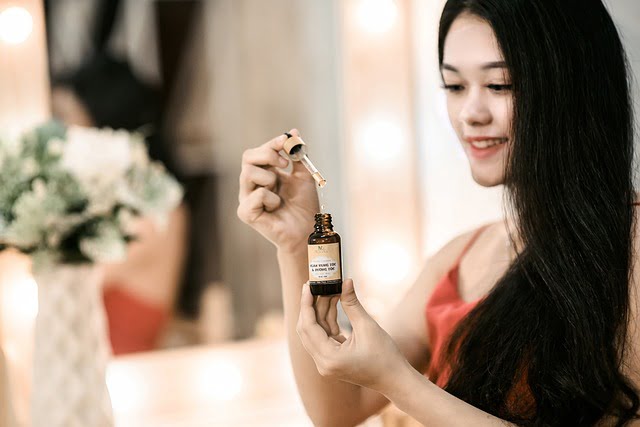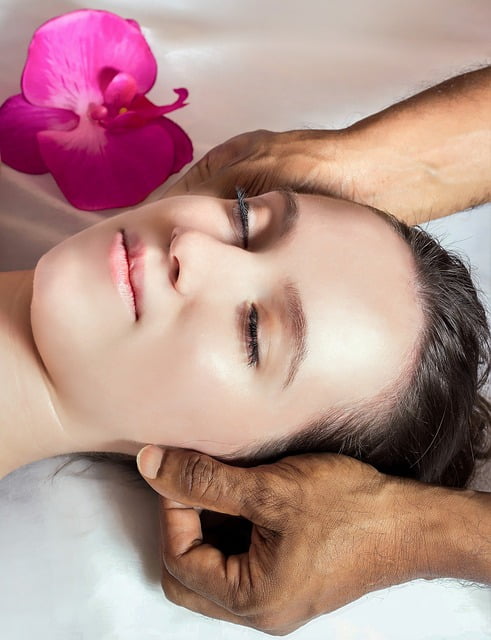
Image credit – Pixabay
Why coconut oil is applied on head ?
- Coconut oil has been found to stimulate hair growth by deeply penetrating hair follicles. In addition, it provides moisture to dry hair and offers numerous other benefits.
- Its use promotes scalp health by combating issues such as insect bites, lice, and dandruff.
- Furthermore, coconut oil helps prevent hair breakage and split ends, which contributes to hair length.
- It is commonly used as a pre-cleansing treatment or as a sealant after washing and styling hair.
- Coconut oil can also be used as an in-between hair cleansing agent to protect and seal hair. However, it is important to note that not all hair types may benefit from the use of coconut oil.
- Before using any oil on your hair, it is recommended to perform a small patch test. Coconut oil has been scientifically proven to penetrate hair cuticles and reduce protein loss.
- It is also effective as a pre-shampoo treatment and can improve hair elasticity in certain hair types.
- Additionally, it can decrease hair breakage and shedding, increase strand strength, and boost hair shine and shimmer.
- Coconut oil can also provide healing for scalp challenges such as dandruff and may temporarily smooth frizz or split ends.
- It can even be used before dying hair to prevent hair coloring damage and help prevent sun, wind, environmental, or other damage.
- Coconut oil is a versatile leave-in conditioning treatment that can help retain hair length. However, it is important to note that repeated use of coconut oil may cause protein build-up, resulting in stiff, hard, and less elastic hair, which can lead to more breakage when combing or styling.
- Therefore, the amount of coconut oil used should be adjusted based on the specific condition of your hair.
How often hair should be applied with oil ?

Image credit – Pixabay
- According to Ayurveda, incorporating hair oiling into your daily routine is recommended almost every day. However, this may not be feasible for everyone. oiling your hair at least twice a week, ideally the night before you plan to wash your hair.
- If leaving the oil on overnight is not possible, you can oil your hair an hour before bathing and wrap your head with a hot towel.
- This will extract some nutrition from the oil in a shorter time frame. Hair oiling is a treatment for healthy hair that originates from Ayurvedic medicinal traditions.
- Regular oiling may prevent hair damage caused by pollution and chemicals present in shampoo.
- It may also increase moisture, luster, and shine, and possibly prevent hair loss. It is important to understand the needs of your hair and choose your oil accordingly, Oiling nightly provides maximum benefits.
Avoid leaving hair with oil overnight
- When it comes to hair oiling, it is important to note that leaving the oil on for an extended period may not necessarily be beneficial.
- While some hair treatments may benefit from longer application times, hair oiling can lead to blocked hair follicles.
- Unless specifically instructed by an ayurvedic doctor or expert to leave a medicated oil on overnight, it is recommended to wash out the oil within 3-4 hours.
- Personally, a 30-minute to 1-hour application time is preferred. According to an ayurvedic doctor, hair oiling is best done as part of a daytime routine, using warm oil that is suitable for the hair type and season.
- It is important to avoid applying oil after consuming food or after sunset, as the hair follicles naturally close towards the end of the day, making it difficult for the oil to be metabolized or absorbed effectively.
- Individuals who are prone to body allergies, colds, coughs, asthma, sinusitis, neck pain, and neck muscle stiffness should avoid hair oiling altogether. Leaving oil on overnight can lead to dust accumulation and weaken the hair.
Avoid oiling a hair with oily scalp
- Having an oily scalp and oily hair can be a challenging combination when it comes to champi.
- However, even if you have dry hair and an oily scalp, oiling may not be the best solution as it can exacerbate pore blockages.
- A more effective approach would be to apply aloe Vera gel, which can soothe the scalp and soften hair without causing greasiness or clumping.
Avoid oil if you struggle with hair fall
- The process of hair oiling is known to strengthen hair roots and prevent hair fall, much like the role of proper nutrition and diet.
- However, if you are already experiencing hair fall, oiling may not be the most effective solution. Instead, a hair mask consisting of yogurt, soaked fenugreek, and kalonji seeds or a mixture of whisked egg, mashed avocado or bananas can be applied to the scalp and washed off after 20 minutes.
- Ayurvedic doctor, dry and brittle hair is prone to breakage.
- There can be various reasons for hair fall, and if it is caused by a dehydrated or dry scalp and hair, oiling can be beneficial.
- Doctor also suggests that certain Ayurvedic hair oils infused with herbs can be effective in treating hair fall as they penetrate deeper than carrier oils such as sesame, olive, or avocado oil, which are suitable for those without hair fall concerns.
Avoid oiling hair if you have dandruff
- Applying oil to the scalp while experiencing dandruff can exacerbate the dry accumulation.
- It is recommended to utilize a cleansing mixture comprising aloe vera gel and crushed neem leaves or neem oil instead.
- If homemade aloe gel is utilized, it is advised to eliminate the sap and blend the gel with water before straining it.
- This will result in a much cleaner scalp. However, it is important to note that neem has a drying effect on the scalp, hence it is advisable to use this mask once a week.
Avoid going overboard with oil
- A small amount of hair oil can go a long way, similar to moisturizers. It is not necessary to apply excessive amounts of oil.
- Begin with a palmful of oil and focus on massaging it deeply into the scalp, adding more to areas that appear dry.
- It is important to note that using too much oil can make it difficult to wash off and may require additional shampooing, which can further dry out the hair.
- For optimal results, it is recommended to apply oil to damp hair and scalp, as it will glide on smoothly, require less oil, and be absorbed more effectively.
- To reduce the amount of hair oil used, some individuals may choose to mix in yogurt or aloe vera gel. This can also make it easier to wash off.
How to massage head with oil ?

Image credit- Pixabay
Preparing your oil for scalp massage
- To prepare coconut oil for scalp massage, it is recommended to select a high-quality, organic, virgin coconut oil.
- If the oil is solid, it should be gently warmed up in the palms or over low heat until it becomes a liquid.
- Additionally, a few drops of essential oils, such as lavender or rosemary, may be added for supplementary aromatherapy benefits.
Techniques for Effective Scalp Massage
- To achieve an effective scalp massage, it is recommended to apply gentle pressure and circular motions that stimulate blood flow and promote relaxation.
- It is important to use your fingertips, avoiding the use of nails, to massage the scalp in a circular motion, gradually moving around the head. Additionally, a scalp massaging tool or a soft-bristle brush can be utilized to enhance the stimulation.
Step-by-Step procedure for Massaging Scalp with Coconut Oil
- To commence, divide your hair into sections and apply a modest quantity of coconut oil to each section.
- Employ your fingertips to delicately massage your scalp in a circular motion, commencing at the front and progressing towards the back.
- Continue the massage for a duration of 5-10 minutes, with particular emphasis on any areas of tension or discomfort.
- Allow the oil to rest on your scalp for an additional 15-30 minutes before rinsing it out with shampoo and warm water.
Frequency and Duration of Scalp Massages
- To achieve optimal outcomes, it is recommended to massage your scalp with coconut oil on a weekly basis.
- Nevertheless, the frequency of this practice may be adjusted according to the specific requirements of your scalp.
- It is imperative to allocate a minimum of 5-10 minutes for the massage, although extending the duration up to 30 minutes can provide additional relaxation.
Precautions to Take Before Massaging Your Scalp with Coconut Oil
- While coconut oil is generally considered safe for most individuals, it is imperative to exercise caution before attempting a scalp massage.
- It is recommended to conduct a patch test to determine any allergic reactions or sensitivities to coconut oil.
- Furthermore, individuals with oily or acne-prone scalps should refrain from using coconut oil as it may exacerbate the condition.
- In summary, a coconut oil scalp massage can serve as a straightforward yet effective method to nourish and stimulate healthy hair growth.
- By appropriately preparing the coconut oil, utilizing gentle massage techniques, and adhering to our guidelines and precautions, one can fully experience the benefits of this natural treatment. Therefore, indulge in some self-care and treat yourself to a soothing coconut oil scalp massage today!
Benefits of applying oil on head
The application of hair oil can provide numerous benefits for both the hair and scalp. Below are some advantages and their corresponding mechanisms:

Image credit – Unsplash
- Moisturization: Hair oils are effective in conditioning and moisturizing the hair, preventing frizz, split ends, and dryness. The oils create a protective barrier that retains moisture and hydrates the hair.
- Strengthening: coconut oil, contain essential nutrients that penetrate the hair shaft and strengthen it from within. This can reduce breakage and enhance the overall health of the hair.
- Reduced Friction: Hair oils can minimize friction between individual hair strands, making it easier to manage and detangle the hair. This is particularly beneficial for individuals with long or curly hair.
- Scalp Health: Massaging oil onto the scalp can improve blood circulation and promote a healthy scalp. Additionally, it can alleviate itching and aid in reducing dandruff.
- Protection: Oils can act as a protective barrier that shields the hair from environmental damage, such as UV radiation and pollutants.
- Shine and Lustre: Hair oils can add shine and lustre to the hair, resulting in a healthy and vibrant appearance.
- Hair Growth: Some oils, such as castor oil, are believed to stimulate hair follicles and increase blood flow to the scalp, both of which can encourage hair growth.
- Read more about Coconut water on empty stomach
What are the ingredients to be mixed in coconut to enhance scalp massage ?
- To optimize the advantages of a coconut oil scalp massage.
- it is recommended to incorporate a small amount of essential oils, such as peppermint or tea tree, to stimulate the scalp and alleviate any discomfort.
- Additionally, warming the oil prior to application or leaving it on overnight can provide supplementary hydration and nourishment.
